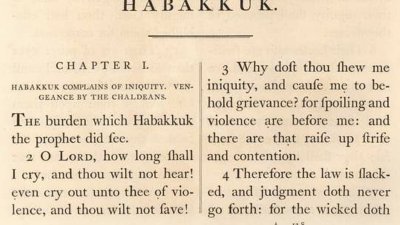It never works out to work without God, let alone to work against God and against His ways. It would not work out for Judah, and Habakkuk wondered in prayerful complaint to God why it seemed like corruption and violence were going unchecked (Habakkuk 1:1-4). God answered that the Chaldeans were coming, give it time, and they would make captives out of the covenant people who had become so corrupt (Habakkuk 1:5-11).
This provoked a deeper complaint from Habakkuk (Habakkuk 1:12-2:1). How could the brutal Babylonians be one of God's instruments to judge those who were, by comparison, at least some more righteous? The Lord's answer takes up Habakkuk 2:2-20.
In verses 2-5 the contrast is between the “puffed up” (mostly a reference to the Chaldeans) and the believers (which must have been only a small remnant in Judah). The arrogant were bent against what is right, the righteous keep living faithfully to God by faith. In verses 6-20 the Lord reveals what's coming to the Chaldeans. It will be the Lord's doing--so He is not letting them slide. And also, the Lord gives lines to the survivors.
> Shall not all these take up their taunt against him, with scoffing and riddles for him, and say, (6a)
The **these** are "all nations" and "all peoples" from verse 5, those that Babylon swallows up. The **him** is the singular reference, not just to Nebuchadnezzar or one of his future heirs, but to the Chaldeans collectively.
There will be **taunt** or “taunt-song” (NASB), **scoffing**, and **riddles for him**, or these last two combined as a “taunting proverb” (KJV). The Chaldeans will become an international proverbial punchline. In Hebrew it’s easy to see multiple double-entendres, rhymes, and word plays. In a day that "will surely come" (2:2), the impossible will be possible, and the superpower will be the super-loser.
There will be taglines, ditties, jokes, one-liners. There will be memes, memes that are both clever and condemning, sober but with real *faith-driven taunting*.
While the “all these (who) take up their taunts” are those who are hurt by the Chaldeans, these taunts are *by faith*. The taunts are pre-captivity. They are announcing the woes *before*, because they ask “for how long?” They ask, “will not” these things happen, and talk about future tense, “the stone will cry out” and “the earth will be filled.” The just shall live in tension, and *the just shall learn to taunt*.
The Lord gives five smooth taunts (so to speak) for us to pick up and put in our verbal arsenal. While this is a big chunk, it's obvious that the woes address the same general group of people, and it's easy to outline, woe by woe. We won't cover every phrase, but we'll get the point. The puffed up will be poked at and put down.
There are also two key contrasts, one in verse 14 and another in verse 20. If living by faith is the key to Habakkuk, knowing what we're having faith *for* is what the key gets us into.
# Woe to those who take what isn't theirs. (verses 6b-8)
The first three woes have some similarity in taking someone else's stuff for opportunistic benefit, future security, and building a public name for oneself. Here is the first: **Woe to him who heaps up what is not his own**. In verse 8 the description is: **you have plundered many nations**, with plundering as violent acquisition of others goods and property, often during a time of disorder.
They would also make loans to survivors in defeated cities, to make even more from interest and exert their own power. But those **debtors** would come calling, and **all the remnant of the peoples shall plunder you.** What goes around comes around isn't a Bible verse, and yet it is a pattern of Providence.
# Woe to those who seek selfish security. (verses 9-11)
The second woe is looking not just to one's current bank account but to one's financial security, even legacy. **Woe to him who gets evil gain for his house**, and while that has application to his today, it probably means more about his future, with **his house** doing double duty as a reference to his property and posterity.
They were making piles of their riches, and trying to set themselves up to be unreachable, **safe from the reach of harm!** This is likely metaphorical, not topological; **his nest** is a reference to a secure place he puts valuable things (like we refer to our nest egg), not to a tall tree-house.
But **cutting off many peoples** to take his cut will result in cutting off his own life. And even the lifeless materials used for the walls will be a witness; the **stone** and the **beam from the woodwork** will cry out. When the sheetrock and two-by-fours mock you there will be no dynasty.
# Woe to those who build by blood. (verses 12-14)
The third woe looks to those who want to extend the party to the city. These are a different sort of city planners, violent visionaries. **Woe to him who builds a town with blood, and founds a city on iniquity.**
This is the center woe, and verses 13 and 14 need some extra attention.
> Behold, is it not from the LORD of hosts
> that people labor merely for fire,
> and nations weary themselves for nothing? (verse 13)
Riddles and taunts have proverbial power, and this smells of Solomonic wisdom-cynicism. Only those with the perspective of faith, so those who can see beyond the sun by the Lord's Word, know that everything is vanity and striving after staying warm. They need fire so they don't have to eat raw meat, and they need fire so they don't have to freeze at night. Wow. Much impressing. Is that all you can do?
Whole **nations weary themselves** to get a big ZERO for what matters and what will last. This is the LORD's doing. He made it that way for the puffed up people. They *think* that they are glorious, that their progress is inevitable, and all their efforts are merely fuel for the fire.
By contrast,
> For the earth will be filled
> with the knowledge of the glory of the LORD
> as the waters cover the sea. (verse 14)
This is where I want to be, don't you? This is what we long for. This is the truest target for our "How long?"s.
See Numbers 14:21 for glory all over, along with Isaiah 11:9 with knowledge all over (as an explicit reference to the Messiah’s millennial kingdom), but Habakkuk makes clear: ***knowledge* of the *glory* of the LORD**.
Every thumb's-width. The rocks and the hills cry out. Deep and wide; deep calls to deep. Wherever there is sea there is water, it's a tautology, true by definition. Without waters there is no sea, and at the appointed time, there will be no spot on the planet that does not *know* the glory. Every measurement--height, depth, breadth, length, through and through. Everything not attached to this vision is vanity.
This hasn't happened yet. We don't even have cell signal covering everywhere yet, and while many of the taunts against Babylon are in syndication re-runs. This faith-stretching and faith-strengthening vision from the Lord to Habakkuk goes *hard*.
# Woe to those who degrade others for pleasure. (verses 15-17)
This woe is about gross levels of entertainment; it’s the back rooms in Hollywood and politician’s offices. **Woe to him who makes his neighbors drink...in order to gaze at their nakedness.**
Turns out, they will be made drunk and show off their own uncircumcision. They forced shame on others, **you will have your fill of shame**. The perversion they poured out will come back to them from the Lord.
**Lebanon** is mentioned in verse 17, a place of great trees, used for buildings and ships. Foreign rulers knew about this lush and productive forrest, and the Chaldeans must have wrecked it for sake of their aesthetic selfishness. Such violence would be done back on them.
# Woe to those who listen to silent gods. (verses 18-20)
Here is the last woe, which could be the first in terms of a motivation for their violence and greed and debauchery and shamelessness. They were following the counsel of silent idols.
We become like who or what we worship. And the Chaldeans became profitless, the product of lies and fake news. **Speechless idols** is the phrase * ʾilləmîm ʾeălîlîm*, or “dumb nothingness,” a mute nonentity. Their gods are laughably silent.
**Woe to him who says to a wooden thing, Awake; to a silent stone, Arise. **
It's all show, all smoke, all veneer of **gold and silver** but **there is no breath in it.** This is insult to idolatry.
> But the LORD is in his holy temple;
> let all the earth keep silence before him. (verse 20)
We sing it, ironically then not being silent. And, it's ironic that this verse leads to Habakkuk's response of a *song* in all of chapter 3. But the puffed up really should shut their mouths and reckon with the LORD.
# Conclusion
Faith is trust in tension, and these lines given by the Lord are so the just will learn to taunt by faith. They are not taunts *down* as a power play, they are taunts up to those in unrighteous power. These are not taunts to the broken and humbled, but to those who are puffed up. These are not even taunts after the fact, but in faith trusting that the Lord is *now* in His holy temple.
Not everyone needs to put a taunt in their Twitter bio. And, not everyone who taunts does it by faith for the glory of the Lord. But the just know that Habakkuk 2:14 is the great telos of our faith, the end for which God created the world. *Woe* to all who work against it.
----------
## Charge
The righteous shall see and fear and laugh at those who will not make God their refuge, who trust in the abundance of their riches. The righteous seek refuge in the anointed Son, and “blessed are all who take refuge in Him.” Remember all that is yours as those who are Christ's.
## Benediction:
> [May you] have strength to comprehend with all the saints what is the breadth and length and height and depth, and to know the love of Christ that surpasses knowledge, that you may be filled with all the fullness of God. (Ephesians 3:18–19 ESV)






